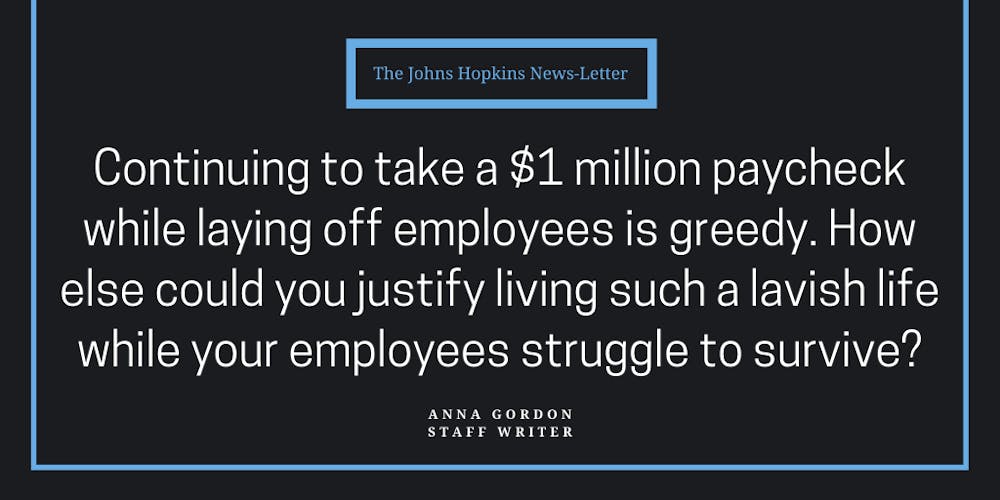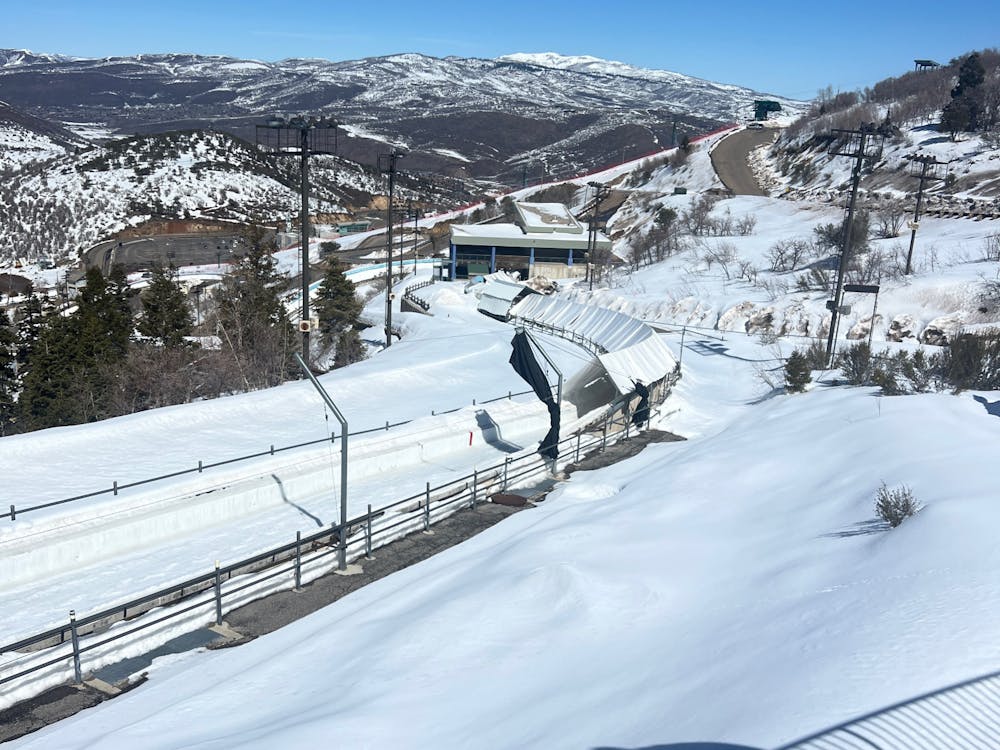Universities around the country are struggling with the economic effects of the coronavirus pandemic. Yet, some college presidents and deans will continue to earn million dollar salaries even as they lay off struggling employees, and Hopkins is no exception.
On Tuesday evening University President Ronald J. Daniels sent out an email warning of upcoming layoffs, hiring freezes and budget cuts. He also announced that he would be cutting his own salary by 20 percent for the next fiscal year, reducing his current salary of approximately $1.3 million to $1.04 million.
To those who are struggling financially due to the pandemic, President Daniels’ 20 percent cut seems unfair. This is especially true when you consider the fact that he also makes money in nontaxable benefits and other income, making his total salary $2.3 million, even after his pay cut.
If Daniels instead took a 75 percent cut, accepting a salary of $325,000, that extra money could be used to provide 42 employees with full-time minimum wage jobs for one year. For University employees who might have otherwise lost their jobs altogether, this could be a major source of relief and stability. This is especially necessary as the unemployment system has become overwhelmed, and many people are not able to access the help they need.
Many employees at Hopkins are hourly wage workers with limited safety nets. Researchers have shown that poverty is deadly and that it leads to worse public health outcomes.
Two professors at Hopkins, Sociology Professor Stefanie DeLuca and Economics Professor Nick Papageorge, have argued that poorer people are going to disproportionately bear the economic costs of social distancing. Low-income people are both less likely to be able to work from home and less likely to have savings they can rely on. Many already lived paycheck to paycheck before this pandemic started.
Wealthy people in our society have a moral duty to help ease this burden. If President Daniels donated 75 percent of his salary, he would still be in the top three percent of Americans by income. He would still be making more than 10 times what the lowest paid Hopkins workers make in base pay alone.
If President Daniels expects the lowest paid workers at Hopkins to survive off $26,540 a year, then certainly we can expect him and his dependents to survive off of $325,000. All his basic necessities would be met, and the money he could donate has the potential to be life-saving by providing people with easier access to basic necessities like groceries, rent and medicine.
President Daniels is not the only college president who has taken a minimal pay cut. President Mark Schlissel of the University of Michigan only cut his $800,000 salary by 10 percent when he announced possible furloughs and layoffs due to the pandemic. President Eric J. Barron of Penn State announced that he would be cutting some employees’ salaries by 50 percent, despite only donating 10 percent of his own $834,000 salary.
This is a matter of morals, not economics. At Hopkins all students are mandated to undergo Bystander Intervention Training. The basic idea is that if you see someone in a potentially dangerous situation, it is your moral duty to try and intervene to help that person.
And yet if we see someone in danger of potential poverty, many of us choose to stand idly by even though we are capable of doing so much more to help.
This pandemic has exacerbated some of the ugliest aspects of our society. Nobody needs a million dollars a year to live. In fact, studies have shown that incomes higher than $105,000 a year do not correlate with increased happiness or life satisfaction.
Continuing to take a $1 million paycheck while laying off employees is greedy. How else could you justify living such a lavish life while your employees struggle to survive? People are suffering, and the actions of many college presidents seem negligible when they are capable of doing so much more.
Unfortunately, higher education has been a bastion of greed, inequality and frivolous spending for a long time now. Nearly 70 university presidents make over a million dollars a year according to the Chronicle of Higher Education. In the past 30 years, college tuition has risen dramatically when you account for inflation, and students have paid the price with debilitating loans.
By paying college presidents such large amounts of money, universities self-select candidates who value material wealth. This has a cyclical effect, as these leaders are more likely to put their efforts into financial and material gains above all else.
This pandemic is the ultimate test of leadership and self-sacrifice. In case President Daniels is reading this, I just want to say that I appreciate the work you do for the University, but I hope you’ll reconsider your pay cut. If you take a smaller salary this year, you could help so many employees. Each one has a family and a story. Each one of them needs that money more than you do.
If you do this, you will earn so much respect and loyalty from the Hopkins community, and that alone is invaluable. In order to be a good leader, you must do what is right for the greatest number of people. You must partake in bearing the burden along with your community. You also have the potential to influence other University presidents by being the first one to take this step. If other presidents follow your lead, you could indirectly help hundreds of people stay employed.
President Daniels, people will remember your actions during this pandemic for years to come. If you play your cards right, they will remember you for your sacrifice and dedication to the Hopkins community.
Anna Gordon is a senior from Los Angeles, Calif. majoring in Economics and International Studies. She is a Staff Writer for The News-Letter.





